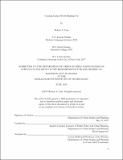Creating games worth bidding for
Author(s)
Cain, Robert A.(Robert Alva)
Download1140386579-MIT.pdf (1.426Mb)
Other Contributors
Massachusetts Institute of Technology. Department of Urban Studies and Planning.
Advisor
Karilyn Crockett.
Terms of use
Metadata
Show full item recordAbstract
Until recently a heavily contested process, the International Olympic Committee has run into difficulty attracting qualified cities willing to host the Olympic Games. Since the 2008 global financial crisis, twelves cities have withdrawn bids due to local referendums or pressure from local groups over the rising costs of hosting the Games or a desire to spend public funds elsewhere. This has left only two candidates remaining by the time the vote was held in the last three award cycles, and three candidates the two cycles prior. In response, the IOC has created a new process focused on working with cities, regions, and even nations to develop host bids which are in line with ongoing policy and development goals, and which will leave a positive legacy after the Games. Using the 2012 Summer Olympic Games in London as a model, I examine whether these changes will be sufficient to deliver the IOC the host cities it is looking for; in short whether such cities are likely to find the new process worth their time and money. While the changes the IOC has instituted are steps in the right direction, they are at some times in conflict with each other. The London model is not replicable in many cities, and does not address the fundamental underlying problem. The cost of Olympic Games have increased too much for many cities, and the IOC has lost some of its goodwill after decades of corruption scandals and delivering multiple Games where the most prominent legacy is massive venues without a clear future use. The IOC must not only work with local officials to create impacts that are in line with larger policy goals, they must also work with local communities to develop a desire to be Olympic hosts.
Description
This electronic version was submitted by the student author. The certified thesis is available in the Institute Archives and Special Collections. Thesis: M.C.P., Massachusetts Institute of Technology, Department of Urban Studies and Planning, 2019 Cataloged from student-submitted PDF version of thesis. Includes bibliographical references (pages 76-84).
Date issued
2019Department
Massachusetts Institute of Technology. Department of Urban Studies and PlanningPublisher
Massachusetts Institute of Technology
Keywords
Urban Studies and Planning.